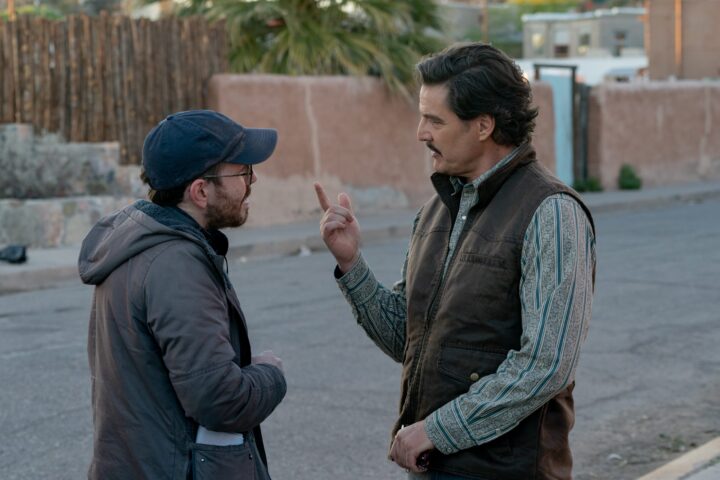There’s a scene late in Rocketman where superstar Elton John (Taron Egerton) phones his estranged mother before a sold-out, about to be televised London show, which, tellingly, she’s preparing to watch from her living room. He’s calling to make a confession of sorts, or a declaration, yet with one stinging remark she regresses him to adolescence, a place he’s lived for many years—and where he has never truly felt loved. It’s a brief moment yet one wholly encapsulating the psyche behind the flamboyant persona, a dichotomy well explored in this extravagant—both by design and in feeling—new movie.
Speaking of extravagance, superstar-in-the-making Egerton delivers a bona fide, coming out star turn, bringing John to energetic life in director Dexter Fletcher’s tuneful fantasia, one of considerable invention and, at times, pure joy to watch. The young actor, a real showman, powers through the musical icon’s highs and many lows with impressive singing and equally impressive emoting.
It should immediately be said that Rocketman is on another level altogether than last year’s wanly empty poseur, Bohemian Rhapsody. A warts and all portrait rather than an exercise in enshrinement, it incorporates scores of Elton John hits, employing a traditional movie musical approach, songs representing formative stretches in the star’s upbringing and rise to fame in imaginative sequences calling to mind the glorious excesses of, say, Ken Russell in his prime. And that’s a very good thing.
Conceptually, Fletcher and screenwriter Lee Hall (Billy Elliott) take artistic license with both narrative structure and musical anachronism, rendering a memory piece scored to John’s vast oeuvre, giving songs new meanings and cleverly placing them in eras where they may not have yet existed but perfectly reflect the space of John’s memory.
We first meet circa early 90s John at rock bottom, decked out in a flaming, fulsome orange spandex regalia complete with feathered wings, entering rehab after an extended plunge into self-destruction and decades as an admitted drug and sex addict, alcoholic, shopaholic and bulimic.
The movie’s structure, a sort of Fosse-esque, All that Jazz confessional of both introspection and excess, begins by flashing back to John’s childhood in 1950s England as a piano prodigy born one Reginald Dwight (Matthew Illesley, Kit Connor) to a self-serving, manipulative mother (Bryce Dallas Howard) and emotionally withholding father (Steven Macintosh). These relationships, and their coldly manipulative machinations, will damage their son well into adulthood.
Young Reggie’s only support is his kindly grandmother (lovely Gemma Jones), who takes him to audition at the Royal Academy of Music, and soon he’s playing at the local pub, dodging fisticuffs and breaking into Saturday Night’s All Right for Fighting, an electric number moving from the pub to cobblestone streets and to a carnival boardwalk, where we first meet teenaged Reggie (Egerton), flanked by a fleet of dancers in full-fledged production number. Egerton bursts through a wooden fence and into the film with muscular singing and lively hoofing, to say the least.
For a while, Reggie is a musician without songs, at least until he meets songwriter Bernie Taupin (Jamie Bell, terrific), who supplies him with endless lyrics (which will become their greatest hits) that Reggie sets to music. This pairing leads to a deep and lasting personal and professional collaboration (“We’ve never had a fight”), and while Reggie harbors something more, Bernie, who is straight, drawns boundaries (“I love you, but not like that”), culminating in a touching rendition of Your Song. That’s one of the picture’s coups, really, recasting songs we’ve loved for most of our lives, giving them additional poignancies.
Things get next-level for the pair upon arriving in Los Angles, and after a levitational—literally—performance of Crocodile Rock at the famed Troubadour, Reggie (who has taken the stage name Elton John) and Bernie are overnight sensations, even partying at the home of Mama Cass (a terrific Tiny Dancer), where Bernie gets a girlfriend and Elton meets a life-changer, manager John Reid (Richard Madden, sexy), who will become his lover and promotor with initially tender, then disastrous results. It’s worth noting that Reid, canonized now in two films, can’t catch a break, receiving a similarly unflattering depiction in Bohemian Rhapsody.
And so it goes. Elton becomes the biggest star in the world yet can’t escape his need for the love he’s been cruelly denied since childhood. He sees Bernie’s romance as a betrayal and takes a while to sort out philandering Reid’s true intentions. And a scene where Elton reunites with his estranged father who has disowned him and is on to a new life with new sons, is heartbreaking.
By the time the picture gets around to its titular song, Elton is self-medicating his loneliness, drowning in pills, booze, self-pity and his swimming pool, confronted by the specter of his childhood self. Then, a suicide attempt: “For my next act, I’m going to kill myself.” What a terrific sequence this is, Fletcher staging a descent to the bottom and glimpse at the origins of the self (in this case adolescent Reggie in a diving bell delivering an eerily beautiful first verse) followed by a hospitalization and onstage rebound, at Dodger Stadium no less, before shooting right back into the stratosphere and onto his private jet.
As Rocketman takes off in its second half, resourceful Fletcher stages one ingenious musical number after another. There’s Elton and partner Reid’s ascent to lush life in Honky Cat; a terrific 360* Pinball Wizard replete with a dozen costume changes; a writhing, orgiastic tangle of bodies in a nightclub, hoisting Elton across in Bennie and the Jets; a melancholy Goodbye, Yellow Brick Road between Elton and Bernie, just before Elton hits bottom; and many more.
The picture is loaded with eye-popping artifice and glamorous decadence, but the revelatory Egerton runs this show, and without limitations he drinks, snorts, prances, “fucks everything that moves,” tenderly cries like a lonely child and sings his heart out. It’s the best performance by an actor in American movies this year, singular yet homage, an original interpretation of immense verve and spirit, reimagining John’s catalog and persona as his own.
The handsome widescreen frame is loaded with elaborately sequined costumes (costumer designer Julian Day has outdone himself) and glittery platforms, but Rocketman is, at heart, about the search for love and self-acceptance, and as such the final number—I’m Still Standing—feels like a hard-won liberation.
Rocketman delivers the euphoric madness of John’s rise, fall and redemption in a carnival of sound, color and theatricality. Yet as much as we know about John’s pop life and vast catalog, we know less about who he was, and what drove him. Egerton’s interpretation of the film’s muse, in all his triumphs and ordeals, is a tremendous illustration of the person behind the music.
Highly recommended.
3 1/2 stars.



